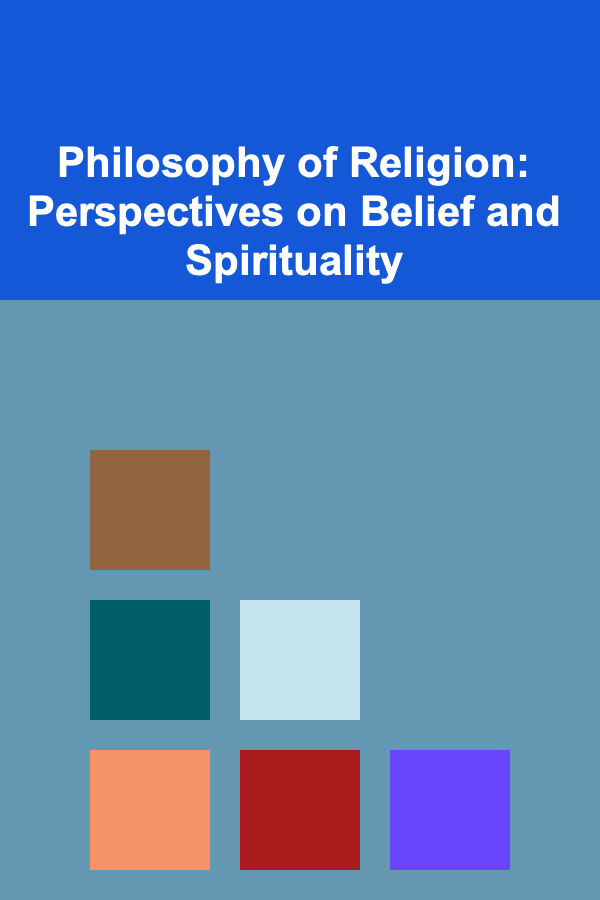
Philosophy of Religion: Perspectives on Belief and Spirituality
ebook include PDF & Audio bundle (Micro Guide)
$12.99$5.99
Limited Time Offer! Order within the next:

The philosophy of religion is a fascinating discipline that explores the deep questions surrounding the nature of belief, the existence of God, the problem of evil, and the role of spirituality in human life. It stands at the intersection of philosophy, theology, and existential inquiry, asking fundamental questions about the nature of the divine and the ways in which humans experience and interpret the sacred. This article aims to explore the major perspectives within the philosophy of religion and offer an actionable guide to understanding belief systems, spirituality, and how they shape our worldview.
The Nature of Belief and Knowledge
Belief systems, whether rooted in religious doctrines, spiritual practices, or philosophical ideas, provide individuals and communities with frameworks for interpreting reality. The philosophy of religion examines how these beliefs form, evolve, and are justified.
Rationalism vs. Faith
One of the central debates within the philosophy of religion is the tension between rationalism and faith. Rationalism asserts that beliefs should be grounded in reason and evidence, while faith often relies on the conviction of truths that cannot be empirically proven. The philosopher René Descartes famously posited the idea of "Cogito, ergo sum" (I think, therefore I am), underscoring the centrality of reason in understanding existence. In contrast, religious faith often entails belief in things beyond the grasp of empirical science, such as the existence of God, the soul, or an afterlife.
The question arises: can belief in God be rational? The answer to this question has evolved throughout history. Thinkers like Thomas Aquinas sought to reconcile faith and reason, suggesting that belief in God could be supported by logical arguments, such as the famous "Five Ways" to prove God's existence. These arguments include cosmological, teleological, and moral reasoning, each attempting to demonstrate the necessity of a divine creator or moral lawgiver.
Faith as a Way of Knowing
On the other hand, philosophers like Søren Kierkegaard argued that faith is not merely a subset of reason but a distinct way of knowing. According to Kierkegaard, religious belief requires a "leap of faith" beyond rational evidence. He contended that faith transcends human logic and is an act of personal commitment that requires surrender to the unknown, acknowledging the limits of human understanding.
Actionable Step:
To better understand the nature of belief, individuals should reflect on the sources and justifications for their own beliefs. Are they based on personal experience, logical reasoning, or the teachings of a particular tradition? This reflection can lead to a more nuanced understanding of how belief functions within one's life and how it interacts with other areas of knowledge.
The Existence of God: Arguments and Counterarguments
The existence of God has been a central issue in the philosophy of religion for millennia. Philosophers have proposed various arguments in favor of the existence of a deity, as well as criticisms that question the plausibility of such a belief.
The Classical Theistic Arguments
The classical arguments for the existence of God are some of the most famous philosophical propositions. These include:
- The Cosmological Argument : This argument posits that everything in the universe has a cause, and that the chain of causes must ultimately be traced back to a first cause, which is identified as God. Thomas Aquinas' "First Way" in his Summa Theologica is a classic formulation of this argument.
- The Teleological Argument (Design Argument): This argument suggests that the complexity and order found in the universe indicate the presence of a designer. William Paley's watchmaker analogy is a well-known expression of this idea, which claims that just as a watch's complexity implies a designer, so too does the natural world.
- The Ontological Argument: Proposed by Anselm of Canterbury, this argument asserts that the very concept of a perfect being (God) necessarily implies its existence. Anselm argued that existence is a perfection, and thus a perfect being must exist.
The Problem of Evil
The problem of evil presents a significant challenge to the belief in an all-powerful, all-knowing, and benevolent God. If God is omnipotent and omnibenevolent, why does evil exist in the world? This issue has been addressed by philosophers such as Epicurus and David Hume, who questioned how the existence of evil could be reconciled with the concept of a loving God.
- Theodicy: In response to this problem, many theologians have developed theodicies---explanations that attempt to reconcile the existence of evil with a good God. One of the most well-known is the "free will defense," which argues that evil exists because humans have been given free will. For God to allow genuine love and moral choice, the possibility of evil must also exist.
- Logical and Evidential Problem of Evil: Some philosophers distinguish between the logical problem of evil (the idea that the existence of evil logically contradicts the existence of God) and the evidential problem of evil (which questions whether the amount and kinds of evil in the world are consistent with a benevolent God).
Atheism and Agnosticism
Atheism is the belief that there is no God, while agnosticism holds that the existence of God is unknowable. Philosophers like Friedrich Nietzsche have argued that belief in God is a projection of human weakness, and that the concept of God no longer serves a functional role in modern society. Others, like Richard Dawkins, advocate for a naturalistic view of the world, arguing that scientific explanations for phenomena like the origin of the universe and life on Earth provide sufficient answers without the need for a divine explanation.
Actionable Step:
Engage with both the classical arguments for and against the existence of God. Read works by prominent philosophers such as Aquinas, Hume, and Nietzsche to develop a deeper understanding of the different perspectives on the existence of God. This can provide a more informed position on the question of the divine and enhance one's ability to critically assess theological claims.
Religion and Morality: Divine Command and Moral Autonomy
A major area of discussion in the philosophy of religion is the relationship between religion and morality. Is morality grounded in divine command, or can moral principles be understood independently of religious belief?
Divine Command Theory
Divine command theory asserts that moral duties are defined by the commands of God. According to this view, actions are morally right if and only if they are commanded by God. This position is often associated with religious traditions like Christianity and Islam, which hold that ethical principles are revealed through sacred texts.
However, divine command theory raises significant questions: If morality is dependent on God's commands, does that mean that something is morally good simply because God commands it, or does God command it because it is inherently good? This leads to the famous "Euthyphro Dilemma," first presented by Plato, which challenges the coherence of divine command theory.
Moral Autonomy and Secular Morality
On the other side of the debate, philosophers like Immanuel Kant and John Stuart Mill argue that moral principles can be derived from reason and human autonomy, independent of divine command. Kant's categorical imperative, for example, suggests that individuals should act in ways that respect the dignity of others and can be universalized. Similarly, secular ethical theories like utilitarianism and deontology provide frameworks for determining right and wrong without invoking the divine.
Secular humanism, for example, holds that humans are capable of determining moral principles based on reason, empathy, and the well-being of others, without the need for a divine moral lawgiver.
Actionable Step:
Examine personal moral beliefs and consider whether they are derived from religious teachings or secular ethical principles. Reflecting on whether moral duties are based on divine command or independent human reasoning can lead to a deeper understanding of the nature of morality and personal ethics.
Spirituality and Human Flourishing
Beyond belief in God, the philosophy of religion also explores the role of spirituality in human life. Spirituality is often seen as an internal, personal experience of the transcendent or divine, and it plays a central role in many religious traditions.
The Role of Spirituality in Well-Being
Spirituality is often associated with practices that foster well-being, peace, and personal growth. Meditation, prayer, and mindfulness are practices found in various religious traditions that are believed to connect individuals to a higher power and promote inner peace. Studies have shown that these spiritual practices can have a positive impact on mental health, providing individuals with a sense of purpose, reducing anxiety, and fostering a deeper connection to the world around them.
Secular Spirituality
Secular spirituality, sometimes referred to as "spiritual but not religious" (SBNR), refers to the pursuit of a sense of transcendence and connection to something greater, outside of traditional religious frameworks. Many people find meaning and purpose through practices such as nature walks, yoga, and artistic expression, without adhering to a specific religious doctrine.
Actionable Step:
Explore different spiritual practices to see which resonate with your sense of purpose and inner peace. Whether through religious rituals or secular mindfulness practices, cultivating spirituality can enhance well-being and provide deeper meaning in life.
Conclusion
The philosophy of religion delves deeply into the nature of belief, the existence of God, the problem of evil, and the role of spirituality in human life. By examining rational arguments for the existence of God, the relationship between religion and morality, and the role of spirituality in fostering human flourishing, individuals can develop a richer understanding of their own beliefs and their place in the world. Engaging with these philosophical perspectives can offer valuable insights into the complex relationship between belief, reason, and the spiritual dimensions of human existence.

How to Deal with Rent Control and Local Regulations for Rental Properties
Read More
How to Optimize Your Spending for Maximum Savings
Read More
How to Plan for Healthcare Costs in Your Retirement
Read More
How to Understand Your Net Worth and Why It Matters
Read More
How to Learn Medical Terminology in a Foreign Language
Read More
10 Tips for Scrapbooking with Fabric and Textiles
Read MoreOther Products

How to Deal with Rent Control and Local Regulations for Rental Properties
Read More
How to Optimize Your Spending for Maximum Savings
Read More
How to Plan for Healthcare Costs in Your Retirement
Read More
How to Understand Your Net Worth and Why It Matters
Read More
How to Learn Medical Terminology in a Foreign Language
Read More